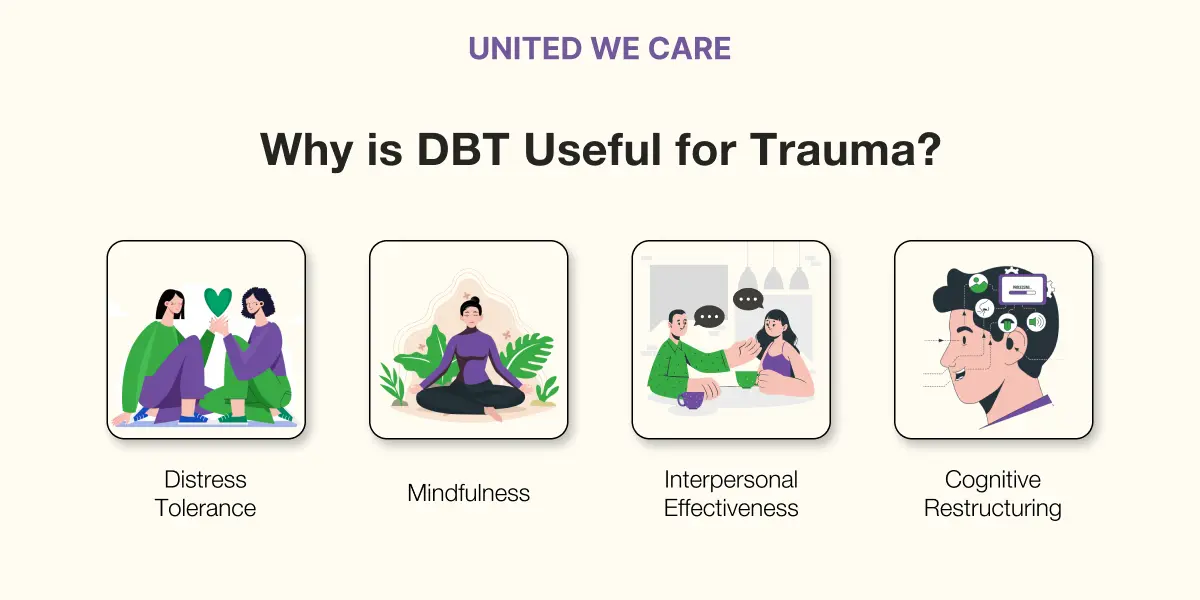Introduction
Did you know that DBT can help someone struggling with PTSD, adverse childhood experiences, and attachment trauma? DBT, or Dialectical Behavioral Therapy, is a type of cognitive therapy designed for people who struggle with intense emotions.
Several elements of DBT can serve to be quite fruitful in the treatment of trauma and related disorders. In this article, we’ll take a closer look at how DBT can be used for trauma survivors. We’ll also explain which specific elements of DBT can help reduce the impact of trauma.
Why is DBT Useful for Trauma
When it comes to trauma, the more commonly known treatment techniques include exposure therapy and pharmacotherapy. However, as trauma impacts a person’s belief systems and self-concept, DBT can be of great use!
Here are some of the elements of this therapy approach that can benefit someone struggling with trauma.

Distress Tolerance
One of the core skills of DBT is the ability to sit with difficult emotions without trying to change them. This competency is better known as “distress tolerance,” and a major portion of DBT involves training in it.
Naturally, this can be of great use for a trauma survivor because it can reduce symptoms of avoidance. Instead of trying to escape their triggers, often which cannot be avoided, the individual can learn to face them.
Mindfulness
Secondly, another core skill in DBT is the practice of mindfulness. This means learning how to be fully present in the moment. To an extent, it also involves noticing what is happening within the body.
Trauma is more present in the body than in the mind. Through DBT mindfulness, an individual can start noticing their dysregulation in the body and work to relax it. Consequently, they can reduce the severity of their trauma symptoms.
Interpersonal Effectiveness
Another major part of DBT is to improve relationships and communication through skills of interpersonal effectiveness. Understandably, this skill can be incredibly beneficial for someone fighting trauma, especially complex PTSD.
Trauma hampers a person’s ability to trust, connect, and sustain relationships. Often, this leads to further feelings of isolation and self-sabotage. DBT can help clients reduce this impact.
Cognitive Restructuring
Once a person has been in therapy for training for a considerable amount of time, the treatment starts shifting towards cognitive restructuring. This is the practice of assigning new meaning to a person’s painful experiences.
One learns how to look at things differently and in a way that promotes well-being. Since DBT also focuses on shifting perspectives, it can be used in an eclectic approach to trauma treatment.
How does DBT Work for Overcoming Trauma?
In this section, we’ll discuss in some more detail how DBT works for overcoming trauma. We’ll also cite some relevant research done in this area of mental health.
Radical Acceptance
Radical acceptance, as the name suggests, is a practice of making deliberate efforts to acknowledge and honor how difficult a situation is. It also requires you to recognize the emotions involved and process their impact on you.
Obviously, this can be of great use if you are trying to get over something traumatic that happened to you. Hence, practitioners often use DBT radical acceptance in trauma treatment [1].
Early Life Trauma
Actually, most trauma, except for single-episode PTSD, usually stems from a long history of adverse life experiences. When a person is exposed to one traumatic life circumstance, it increases the risk of the next one happening.
A lot of such early-life trauma can be dealt with in therapy for adults using DBT [2]. The individual, in due course of time, learns to accept their reality. Moreover, they learn to look at their life history in ways that inspire hope and resilience.
Combined with Exposure Therapy
As mentioned in the previous section, one crucial area of DBT is training in distress tolerance. As a result, the individual learns how to sit with their discomfort, acknowledge it fully, and not try to change it.
As exposure therapy is a commonly opted treatment for PTSD and trauma, distress tolerance can aid both the therapist and the client. Together, both these types of treatments can help a person deal with their triggers.
Advanced Stage of Treatment
Going by the Active Ingredients Approach to trauma treatment, therapy sessions can be roughly categorized into progressive stages [3]. In the later stage, treatment has advanced enough to establish a secure therapeutic alliance and training in body regulation.
At this point, the individual is capable and ready of cognitive restructuring and behavioral therapy. Therefore, DBT can work as the chosen cognitive therapy in this stage.
Where do I find the Best DBT Therapy for Trauma?
DBT can only be practiced by a licensed mental health professional, preferably with certification in Dialectical Behavioral Therapy. This can include a psychologist, psychiatrist, and trained psychiatric social worker.
You can find someone with the necessary qualifications by looking up nearby mental health clinics. In case you are seeking help from a life coach or spiritual counselor, make sure they have been trained in DBT from an accredited source.
If you are looking for online support, you can always check out the wide range of experts at United We Care. Rest assured that our trained professionals can help you with all your concerns about trauma and DBT.
Conclusion
DBT, or dialectical behavioral therapy, is a treatment approach that can be used for various mental health conditions, including trauma. The DBT elements of distress tolerance, mindfulness, interpersonal effectiveness, and cognitive restructuring help reduce trauma symptoms.
When it comes to trauma treatment, DBT can assist with radical acceptance, adverse childhood experiences, exposure therapy, and cognitive therapy. You can find the best DBT therapists both online and offline.
References
[1] Görg, N., Priebe, K., Böhnke, J.R. et al. Trauma-related emotions and radical acceptance in dialectical behavior therapy for posttraumatic stress disorder after childhood sexual abuse. Bord personal disorder emot dysregul 4, 15 (2017). https://doi.org/10.1186/s40479-017-0065-5
[2] Choi-Kain, L., Wilks, C.R., Ilagan, G.S. et al. Dialectical Behavior Therapy for Early Life Trauma. Curr Treat Options Psych 8, 111–124 (2021). https://doi.org/10.1007/s40501-021-00242-2
[3] Gentry, J.E., Baranowsky, A.B. and Rhoton, R., 2017. Trauma competency: An active ingredients approach to treating posttraumatic stress disorder. Journal of Counseling & Development, 95(3), pp.279-287.










